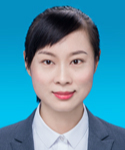| Biography | |
|---|---|
 Prof. Ran Niu Huazhong University of Science and Technology, China |
|
| Title: Self-assembly and modular microswimming | |
| Abstract: Micro-/nanoswimmers (also called motors) have attracted significant interest due to their suitability for applications in biomedical engineering and environmental remediation. Typical biological and artificial micro-swimmers use non‐reciprocal motion (e.g. flagellae) or phoretic propulsion (e.g. driven by chemical reactions) [1]. We here present a complementary approach to micro‐swimming by combining several non‐active parts to self‐organize into a self‐propelling complex. Our modular phoretic micro‐swimmer consists of an ion exchange resin (IEX) particle (being the fuel reservoir) and a charged colloidal particle (CP, acting as gearing), both settled to a charged substrate and hydro‐dynamically coupled by an electro‐osmotic solvent flow along the substrate (acting as a motor), which is caused by the gradient generated by the IEX [2,3]. Combining experiment, theory and simulation, we systematically characterize the self-assembly and swimming performance of this complex as a function of system parameters and understand the underlying mechanisms [4-6]. We further show how the moving direction and speed of this complex can be controlled for potential applications.
[1] V. Yadav, W. Duan, P. J. Butler, and A. Sen, Annu. Rev. Biophys. 44, 77 (2015). [2] A. Reinmüller, H. J. Schöpe, and T. Palberg, Langmuir 29, 1738 (2013). [3] R. Niu, D. Botin, J. Weber, A. Reinmüller, T. Palberg. Langmuir 33, 3450−3457 (2017). [4] R. Niu, T. Palberg, T. Speck. Physical Review Letters 119, 028001 (2017). [5] R. Niu, A. Fisher, T. Palberg, T. Speck. ACS Nano 12, 10932−10938 (2018). [6] R. Niu, P. Kreissl, A. T. Brown, G. Rempfer, D. Botin, C. Holm, T. Palberg, J. de Graaf. Soft Matter 3, 1505−1518 (2017). | |
| Biography: Ran Niu obtained her PhD in 2015 investigating colloid/polymer composites under shear at Chinese Academy of Science, China. She did her first postdoctoral research in Institute of Physics, University of Mainz, applying self-assembly of colloidal particles in modular micro-swimming. Then she moved to Physics Department of Cornell University in 2018, where she did her second postdoctoral research studying the programmable self-assembly of magnetic handshake materials and de-shear thickening of concentrated colloidal suspensions. She became full professor of School of Chemistry and Chemical Engineering, Huazhong University of Science and Technology in September 2020. Her main interests are using colloidal particles as model systems for soft condensed matter and their applications. She has worked on rheology, phase transition and self-assembly. Current focus is micro-swimming and its application in environmental remediation and targeted drug delivery. | |
